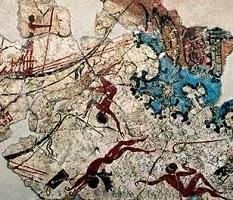Wisdom of the Wreck: Lenten Meditation, 2/14/2013
Psalm 69:8-18
By: Cameron Partridge

I came to explore the wreck.
The words are purposes.
The words are maps.
I came to see the damage that was done
and the treasures that prevail.
(Adrienne Rich, “Diving Into the Wreck,” in The Fact of a Doorframe)
In “Diving Into the Wreck,” one of my favorite poems by the late Adrienne Rich, a diver undertakes an inner inventory. The object of the search is a sunken ship, an epic disaster long settled on the ocean floor. On the lip of catastrophe, its crew might well have shouted the words of today’s psalm: “Do not let the flood sweep over me, or the deep swallow me up, or the pit close its mouth over me” (Ps 69:15). But because Rich’s poem surveys the scene from the other side, it can offer a strangely serene perspective, a certain wrecked wisdom.
This is a time of transition, struggle and risk in the lives of many I know, both in and out of the church, and indeed, in the life of the church itself. Many strain toward life goals of one sort or another – the finishing of a degree, the assurance of a job after the degree, the securing of a job or of affordable housing so that one can finish the degree. Many are terrified of falling short, of feeling stranded or estranged, of being in one way or another, as the psalm puts it, “a stranger to my kindred, an alien to my mother’s children” (Psalm 69:8). Again and again I encounter a longing for security of place, clarity of purpose, recognition of our distinctive humanity, connection in community. The psalmist gives voice to a deep-seated fear and desperation, and its prayer is one of holding on, of survival.
Nothing could be more natural than to want to avoid a wreck, imminent or ancient. How could we not beg the God of Moses to deliver us from impending flood? Did not Jesus himself rage in terror and abjection from the brink of death’s chasm?
But here’s the thing: We are, all of us, always already swallowed, just as surely as we are always already redeemed. Even if we weather the most immediate crisis, even if we manage to make every last family member proud beyond belief, the waves will drench us at some point. Yet just as surely as that will happen, we are also surrounded by the God who made us, has reconciled us, and calls us into a life that utterly transforms the wisdom of our world (including that of maintaining all one’s ducks in a row). Indeed, a life that changes the world itself, turns it upside down. And inevitably, this turning entails a certain upheaval on our part. There’s really no way around that.
But none of this means we must stay silent, must somehow welcome the waves as friendly companions. Indeed, strange as this may sound, there is a ragged wisdom to the psalmist’s cry, a kind of self-offering to the One who took on our estrangement, entered our ocean and came out the other side, knows our very hearts, honors the truths we shout from its depths.
I wonder if perhaps, as we stand in our thresholds of fear and uncertainty – whatever our particular circumstance or location – we might be strengthened by knowledge of this vast connection, this intimate solidarity. Whether we stand on the verge of disaster or explore it in hindsight, perhaps we might be buoyed to know that there is no estrangement that can, finally, separate us from divine love, a love that sustains and transforms us and, with that transformation, re-forges the very world in which we dwell.
Let us pray:
O God of mystery, who refracts the world’s wisdom through the lens of divine foolishness and has charted our course through the belly of the deep: grant us the courage to be swallowed up by life and the perspective to discern in our depths those truths that draw us into your freedom; through Jesus Christ, the firstborn of the dead. Amen.
